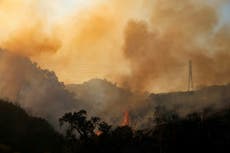‘A literal firestorm’: Timelapse shows 700,000 lightning strikes pounding Canada as a result of heatwave wildfire
The storms will likely exacerbate a deadly season of fire and heatwaves, experts say
Wildfires in western Canada have generated massive clouds that are spreading across the country, causing more than 710,000 lightning strikes in a single night and likely fuelling a new crop of wildfires in a country already struggling with a deadly heatwave.
Satellite imagery captured pyroconvective clouds – powerful, turbulent formations created during wildfires – blooming across Canada between Wednesday afternoon and Thursday morning, creating a total of 710,117 lightning events, according to the North American Lightning Detection Network. That equated to about 5 per cent of Canada’s normal annual lightning.
Meteorologists and climate scientists warned these clouds and the resulting lightning strikes could create even more wildfires across a nation already struggling with them.
“I’ve watched a lot of wildfire-associated pyroconvective events during the satellite era, and I think this might be the singularly most extreme I’ve ever seen,” University of California Los Angeles climate scientist Daniel Swain wrote on Twitter on Wednesday.
“This is a literal firestorm, producing thousands of lightning strikes and almost certainly countless new fires.”
These sorts of firestorms are a nightmare for firefighters.
“Most of the time, a pyrocumulonimbus has the combination of conditions that firefighters dread – strong winds, no rain and lightning,” University of Colorado ecologist Jeff Mitton said. “The fire causes the cloud, which then fans the fire and might ignite subsidiary fires with lightning.”
Canada is already wracked with the same heatwave, drought, and wildfires affecting much of the US Pacific northwest.
Over the last week, at least 486 people died suddenly in British Columbia, according to Lisa Lapointe, the Canadian region’s chief coroner.
“While it is too early to say with certainty how many of these deaths are heat related, it is believed likely the significant increase in deaths reported is attributable to the extreme weather BC has experienced,” she said in a statement.
Vancouver police have dispatched extra officers to respond to an alarming number of death calls, including many from older people. “We’ve never seen anything like this and it breaks our hearts,” sergeant Steve Addison said in a statementon Wednesday.
The climate crisis has only strengthened heatwaves like the one afflicting Canada, according to scientists.
“Climate change is increasing the frequency, intensity and duration of heatwaves,” Kristie Ebi, a University of Washington health and environment professor, told The New York Times on Wednesday. “When you look at this heat wave, it is so far outside the range of normal.”
Join our commenting forum
Join thought-provoking conversations, follow other Independent readers and see their replies
Comments



Bookmark popover
Removed from bookmarks